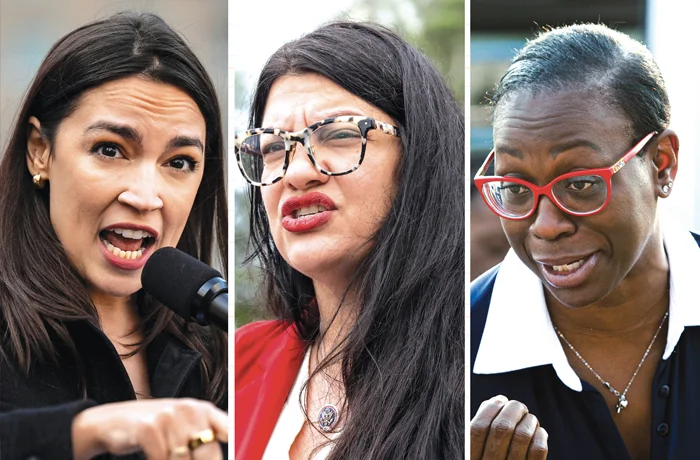The DNC has a DSA dilemma.
A Democratic Party looking to make some electoral purple somewhere in the red sea between the coasts on the 2024 election map wants to run to the middle to bring working-class voters back to its fold. Meanwhile, the young blood in the Democratic Socialists of America that drives publicity and fundraising for the party remains determined to sail hard left.
Until recently, the DSA was barely a blip on the sociopolitical radars of most voters focused on the ever-present machinations of Republicans and Democrats. That changed with Zohran Mamdani’s win in the June 24 Democratic primary in the New York mayoral campaign and the activities of anti-Immigration and Customs Enforcement members, including Nithya Raman, Eunisses Hernandez, Hugo Soto-Martinez, and Ysabel Jurado, of the Los Angeles City Council. American voters are paying attention now.
Many U.S. voters mistakenly believe the socialist group is a fully-fledged political party. In reality, the DSA is a policy organization actively supporting leftist local, state, and national candidates, including Rep. Alexandria Ocasio-Cortez (D-NY), Rep. Rashida Tlaib (D-MI), and Nina Turner, a former state senator in Ohio who has lost several bids for Congress and statewide office.

While DSA-promoted politicians get plenty of publicity and draw their share of financial donations, the group’s socialist policies threaten to alienate Democrats from national voters wary of extremist views.
Requests for comment from the Democratic National Committee and the DSA did not receive responses, but Western Carolina University political science professor Chris Cooper sees the Democrats’ internal conflict hindering the party’s efforts to recover from losses in 2024. Still, the Haire Institute for Public Policy director reminded voters that political bodies often evolve their identities through similar conflicts.
“The situation is not ideal for the Democrats,” Cooper said. “But these are the normal kinds of intra-party battles we see after election cycles. It just appears a little rammed up right now.”
Cooper acknowledged the heat of war building between DNC éléments and traditionalist Democrats. But he sees the party having plenty of time to work out its identity before it must face delighted Republicans again.
“I think there’s very much a battle for what the future of the [Democratic] party should look like,” he explained. “And I don’t think it’s entirely clear which side wins. All along, the Republicans are happy because the Democratic Socialists are playing right into the RNC’s hands nationally.”
If its party members search for a peaceful path between the centrist and DSA landmarks, Cooper believes national leadership can continue to point DSA weapons at local elections.
“The Democrats are not going to run socialists,” he explained. “They’re not going to run [DSA] members for major party candidacy. They’re going to run DSA members in places where it might make a difference — where it might actually matter. So, still, we’re talking about LA, New York, San Francisco — maybe Boulder, Minneapolis.”
Cooper finds it interesting that wherever DSA candidates emerge for the Democrats (usually safe blue territories such as New York, Chicago, and Los Angeles), their presence becomes national news and a possible referendum on the policies of President Donald Trump.
“There doesn’t seem to be local politics anymore,” he said. “Even [candidates and politicians] who have no influence over national policies, like the mayor of New York or the governor of California, run on opposing Trump’s policies.”
National campaign expert and Florida Gulf Coast University professor emeritus Peter Bergerson agrees with Cooper that Democrats have a DSA problem to a degree, but he disagrees that the success or failure of the latter’s socialist matters no longer play out locally.
“I see the possibilities of Democrats taking back Congress in 2026 to be more driven by local, district, or statewide issues as opposed to the four years of Trump policies or the polices of the DSA,” Bergerson said. “The conditions and populations of different communities decide if (leftist) policies appeal.”
While he also sees the DSA working to dig out local support in cities most open to its platform, Bergerson stressed that the DNC still faces the challenge of convincing a national electorate that sees it in disarray to support it once again.
“Settling its internal struggles is going to be a serious challenge (for Democrats), especially looking to the 2028 election,” he added. “It seems clear to me that the Democratic Party on the national level will face a shake-up with their leadership as the younger members draw more name recognition.”
While some pundits argue that the DSA’s leftist focus led Democrats to the losing end of so-called “80/20 issues,” Bergerson believes the party is not as far from the American mainstream as Republicans might believe.
“I think (the 80/20 issue analysis) might be a little overblown mathematically, but (Democrats) do seem to be on the short end of some key issues that are hurting them,” Bergerson said. “I think we go back to the idea that different issues concern different states and regions. The change in issues and the appeal of leftist policies are rooted in the difference within populations.”
Thomas Whalen, associate professor with the Boston University Department of Social Sciences, thinks the idea of a Democratic Party in a state of rebellion and chaos is overly dramatic.
“If you look at the popular vote in the 2024 presidential election, there’s really only half a percentage point between the Republicans and Democrats,” Whalen said. “The margins on congressional races and Senate races were often not overwhelming. So, the Democrats might struggle for a while, but they could take back the Senate by a seat or two [in 2026].”
Whalen insisted the 2024 aftermath for the Democrats reminds him of 1964 when the Republican nominee, former Republican Arizona Sen. Barry Goldwater, lost handily in the general election to former President Lyndon Johnson.
“Everyone was writing the obituary for the Republican Party,” he explained. “What we tend to see instead is, while the public might lean left or right, most voters tend to bounce around the middle — the great middle. So, I think (the DSA/Democrat conflict) is a washout, frankly. Do Los Angeles in New York represent the country? Or the Democratic Party as a whole? That’s never been the case.”
SWAN SONG FOR SUPPLY-SIDERS? ‘BIG, BEAUTIFUL BILL’ SIGNALS SHIFT IN GOP
While the supposed scenario of an intra-party civil war hovers over the Democrats, Whalen suggested much of that fuss is driven by Republicans looking to keep their base activated.
“It does seem to give Republicans a nice distracting target — playing the hyperbole card,” he said. “But does anyone think the Democrats are going to find themselves in a place where they nominate an AOC for president? No.”
John Scott Lewinski, MFA, is a writer based in Milwaukee.























